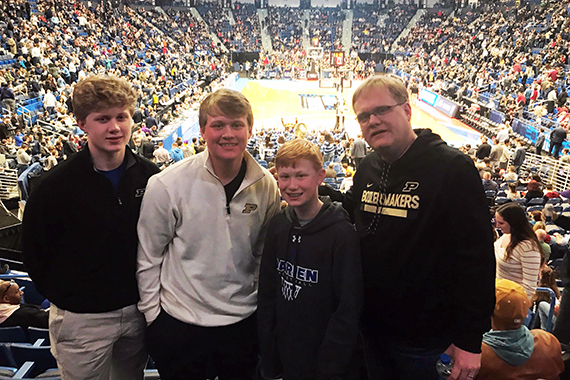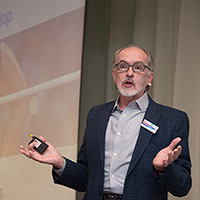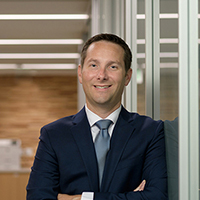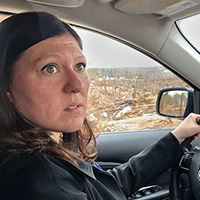 Keith Olson is CFO and executive vice president at the Council on Foreign Relations (CFR). His oldest son, Ben, is a freshman at Purdue. (Photo provided)
Keith Olson is CFO and executive vice president at the Council on Foreign Relations (CFR). His oldest son, Ben, is a freshman at Purdue. (Photo provided)
Guiding Principles
Keith Olson builds a rewarding career in the nonprofit sector
A guidance counselor was the first to recommend Purdue to Keith Olson (BS ECON, BSIM, ’91), who grew up in south suburban Chicago and was among the first in his family to attend college. Although it meant paying out-of-state tuition, he says it was still less expensive than in-state schools. “There was a focus on affordability even then and more so today under President Daniels.”
His introductory visit to campus was as an accepted student the summer before his first semester. “We took a math placement test in the Krannert Auditorium,” he says. “The proctor said, ‘Look to the left and then to the right. One of you is going to graduate.’ It was the classic stuff they tell students. And then we went home and I showed up a couple months later on a Sunday afternoon and started classes the next day.”
Once he settled in, Olson quickly found himself at home. “I liked the fact that it was a small school within such a huge place like Purdue,” he says. “Besides having fewer students, my classes were broader in focus, which along with some elective coursework outside of Krannert gave me a well-rounded education. I was fortunate to go in with some AP credit, and I stuck around all four years and ended up getting a double degree in economics and industrial management. I remember how proud my dad was when I graduated.”
After three years as a consultant with KPMG, Olson chose to further his education with an MBA from Duke University.
“I took a fairly traditional path out of business school into an investment banking role with the Prudential Capital Group, and ended up leaving that to work for an internet startup in Southern California with a couple of friends,” he says. After the dot-com bubble burst, he briefly returned to consulting before joining the Bill and Melinda Gates Foundation as director of financial planning and analysis. He later served as interim CFO.
“I never specifically intended to work for a nonprofit. It was just an opportunity that presented itself,” Olson says. “I sent in a blind resume, and at that point, the foundation was at a different place. There was a piece that did internet access at public libraries, and then there was another piece that had started to do a lot more of the global health and education work that they are known for now.”
Olson felt privileged in his role with the foundation. “Most of the employees of the foundation end up working in one of the specific program areas, but the financial planning and analysis team had more of a horizontal view,” he says. “We got to work with a lot of different programs across the full span of the foundation.”
Beyond financial modeling for scholarship programs and local initiatives with early learning programs in the Pacific Northwest, Olson’s role included trips to India as part of the foundation’s HIV program and to Africa for various agricultural initiatives.
“A lot of what I did was grantee due diligence. I looked at what the different program goals were going to be and how that might translate into the amount of grants that it would require to start to move the needle on things. It was also a time of tremendous growth at the foundation. I think there were about 200 employees when I started and about 1,400 when I left eight years later.”
Today, as CFO and executive vice president at another nonprofit, the Council on Foreign Relations (CFR), Olson has taken on a role with more responsibility within a smaller environment. “At CFR, I have broader administrative duties,” he says. “Our IT team reports up through me. We also have a facilities group, many digital operations, and an endowment that I work closely on with the CIO.”
Olson, whose son, Ben, is now a freshman at Purdue, advises students and prospective job seekers to develop their technical and analytical skills.
“We look for people who are highly analytic and comfortable with crunching numbers,” he says. “They need the skills to adapt to a real-world situation and understand what analytics drive it, to create some meaningful metrics or data analysis that sheds light on whatever decision we're trying to make.”
Olson says communication skills are equally important.
“Whether it is in written or spoken form, being able to explain what you've done is critical. You need to convince your colleagues that you've looked at something the correct way and that you helped simplify or solve a problem,” he says. “I think Purdue is strong in that regard. Just from looking at some of my son’s course requirements, it seems like the University is clearly focused on developing good, well-rounded graduates.”







